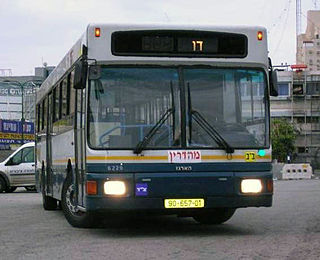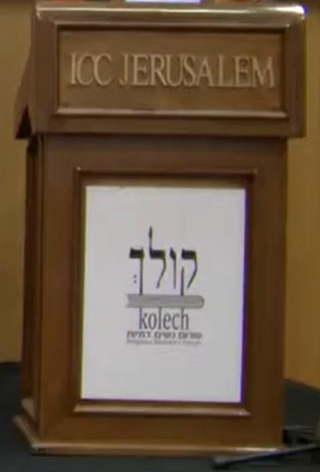Related Research Articles

Haaretz is an Israeli newspaper. It was founded in 1918, making it the longest running newspaper currently in print in Israel. It is published in both Hebrew and English in the Berliner format. The English edition is published and sold together with the The New York Times International Edition. Its Hebrew and English editions are available on the internet. In North America, it is published as a weekly newspaper, combining articles from the Friday edition with a roundup from the rest of the week. Haaretz is Israel's newspaper of record. It is known for its left-wing and liberal stances on domestic and foreign issues.

Moshe Katsav is an Israeli former politician who was the eighth President of Israel from 2000 to 2007. He was also a leading Likud member of the Israeli Knesset and a minister in its cabinet. He was the second Mizrahi Jew to be elected to the presidency after Yitzhak Navon.
Shas is a Haredi religious political party in Israel. Founded in 1984 under the leadership of Rabbi Ovadia Yosef, a former Israeli Sephardi chief rabbi, who remained its spiritual leader until his death in October 2013, it primarily represents the interests of Sephardic and Mizrahi Haredi Jews.

ZAKA is a series of voluntary community emergency response teams in Israel, each operating in a police district. These organizations are recognized by the Israeli government. The full name is "ZAKA – Identification, Extraction and Rescue – True Kindness". The two largest ZAKA factions are Zaka Tel Aviv and ZAKA Search and Rescue.

The Israel Police is the civilian police force of Israel. As with most other police forces in the world, its duties include crime fighting, traffic control, maintaining public safety, and counter-terrorism. It is under the jurisdiction of the Minister of Public Security. The National Headquarters of the Israel Police is located at Kiryat HaMemshala in Jerusalem.
The Buddhist Association of China is the official government supervisory organ of Buddhism in the People's Republic of China. The association has been overseen by the United Front Work Department (UFWD) of the Central Committee of the Chinese Communist Party (CCP) since the State Administration for Religious Affairs' absorption into the UFWD in 2018. The association's headquarters are located in Guangji Temple in Beijing.

Lesbian, gay, bisexual, and transgender (LGBT) rights in Israel are considered the most developed in the Middle East. Although same-sex sexual activity was legalized in 1988, the former law against sodomy had not been enforced since a court decision in 1963. Israel became the first country in Asia to recognize unregistered cohabitation between same-sex couples, making it the first country in Asia to recognize same-sex unions in any capacity. Although same-sex marriages are not performed in the country, Israel recognizes same-sex marriages performed elsewhere. Discrimination on the grounds of sexual orientation was prohibited in 1992. Same-sex couples are allowed to jointly adopt, following a landmark court decision in 2008. Previously, stepchild adoption, as well as limited co-guardianship rights for non-biological parents, were permitted. LGBT people are also allowed to serve openly in the military.

Mordechai (Moti) Elon is an Israeli Religious Zionist rabbi. He has headed several Orthodox Jewish social organizations and institutions, most notably as Rosh Yeshiva of Yeshivat HaKotel in the Jewish Quarter of Jerusalem from 2002 to 2006. He has also hosted television and radio shows.

Manis Friedman is a Hassid, rabbi, author, social philosopher and public speaker. He is also the dean of the Bais Chana Institute of Jewish Studies. Friedman authored Doesn't Anyone Blush Anymore?, which was published in 1990 and is currently in its fourth printing. He is featured in the documentary films: The Lost Key (2014), The Jewish Journey: America (2015), and "Patterns of Evidences" (2017).

Shmuel Eliyahu is an Israeli Orthodox rabbi. He is the Chief Rabbi of Safed and a member of the Chief Rabbinate Council.

Bat Kol is an Israeli organization that provides support services to lesbians who are Orthodox Jews.

Edna Arbel is an Israeli lawyer who was a justice on the Supreme Court of Israel from May 2004 to June 2014. She is a native of Jerusalem.

Mehadrin bus lines were a type of bus line in Israel that mostly ran in and/or between major Haredi population centers and in which gender segregation and other rigid religious rules observed by some ultra-Orthodox Jews were applied from 1997 until 2011. In these sex-segregated buses, female passengers sat in the back of the bus and entered and exited the bus through the back door if possible, while the male passengers sat in the front part of the bus and entered and exited through the front door. Additionally, "modest dress" was often required for women, playing radio channels or secular music on the bus was avoided, while advertisements were censored. Mehadrin lines were generally cheaper than other lines. In early 2010, there were 56 Mehadrin buses in 28 cities across Israel operated by public transportation companies, although usually not specifically labelled.

Women in Israel comprise 50.26 percent of the state's population as of 2019. While Israel lacks an official constitution, the Israeli Declaration of Independence of 1948 states that “The State of Israel (…) will ensure complete equality of social and political rights to all its inhabitants irrespective of religion, race or sex.”

The Haredi burqa sect, is a religious group within Haredi Judaism, primarily concentrated in Israel, which claims that modesty requires a burqa-style covering of a woman's entire body, a shal, and a veil covering the face. In effect, no skin is exposed to the public. The garment is also called frumka, a play of the word frum and "burqa". The group, which was estimated to number several hundred as of 2011, is concentrated in the town of Beit Shemesh. Members of the sect rarely leave their homes, and are accompanied by their female children, also dressed in long robes, when they do.
Religious relations in Israel are relations between Haredim, non-Haredi Orthodox, Karaite, Ethiopian, Reform, Conservative, and secular Jews, as well as relations between different religions represented in Israel. The religious status quo, agreed to by David Ben-Gurion with the Orthodox parties at the time of Israel's declaration of independence in 1948, is an agreement on the role that Judaism would play in Israel's government and the judicial system. Tensions exist between religious and secular groups in Israel.

Amir Ohana is an Israeli lawyer, former Shin Bet official and politician who has served as the Speaker of the Knesset since 2022, and as a member of the Knesset for Likud. He previously held the posts of Minister of Justice and Minister of Public Security. He was the first openly gay right-wing member of the Knesset and the first openly gay man from Likud to serve in the Knesset. He is also the first openly gay person to be appointed as a minister in the Israeli government and the first openly gay Speaker of the Knesset.
The Israeli military consists of the Israel Defense Forces and the Israel Border Police, both of which engage in combat to further the nation's goals. Israel's military is one of the most accommodating in the world for LGBT individuals. The country allows homosexual, bisexual, and any other non-heterosexual men and women to participate openly, without policy-based discrimination. Transgender men and women can serve under their identified gender and receive gender affirming surgery. No official military policy prevents intersex individuals from serving, though they may be rejected based on medical concerns.

Kolech, also known as Kolech: Religious Women's Forum, is an Israeli women's organization associated with Orthodox Judaism. The group's stance is aligned with Orthodox Jewish feminism and religious Zionism.

The thirty-seventh government of Israel is the current cabinet of Israel, formed on 29 December 2022 following the Knesset election on 1 November 2022. The coalition government consists of six parties—Likud, United Torah Judaism, Shas, Religious Zionist Party, Otzma Yehudit, and Noam—and is led by Benjamin Netanyahu, who has taken office as the Prime Minister of Israel for the sixth time. The government is notable for its inclusion of far-right politicians.
References
- ↑ Rotem, Tamar. "Little woman, or big threat?". Haaretz. Retrieved 23 February 2010.
- ↑ Levy, Gideon. "Sexual assault punished differently among religious, secular Jews". Haaretz. Retrieved 23 February 2010.